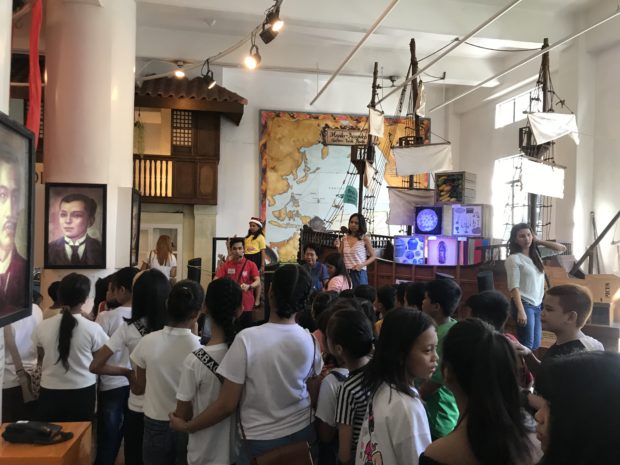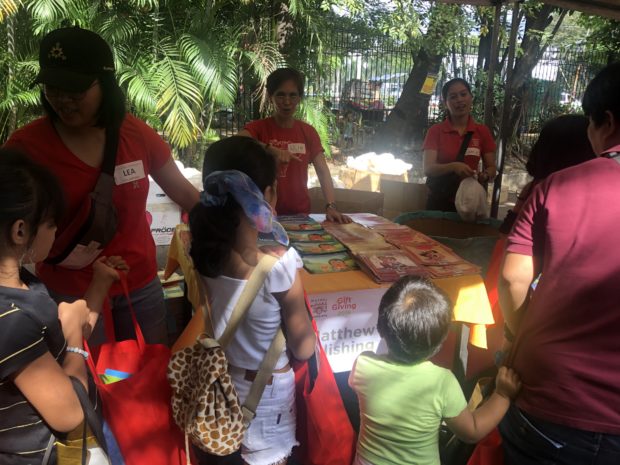An unforgettable day at the Museo

KID-FRIENDLY Beneficiaries get to tour the Museo Pambata for free, allowing them to learn about science and the history of Manila, among other topics, through hands-on exhibits.
MANILA, Philippines — For 15-year-old Alyssa, the highlight of the Christmas season used to be a simple “salu-salo” she would share with other children on the narrow streets of the Gawad Kalinga (GK) community in Barangay Escopa III in Project 4, Quezon City.
Surrounded by the colorful concrete houses built by GK for persons with disabilities and informal settlers, the teenager and her friends would amuse themselves — not by showing off the gifts they received because not everyone had one — but by playing games like “Bring me,” “Stop-dance” and the crowd favorite “Hep, hep, hooray!”
Since last year, however, Alyssa has had something else to look forward to: the Museo Pambata Foundation Inc.’s annual holiday gift-giving activity for underprivileged minors.
“In our village, we don’t usually get to go out and learn. It is important for us to participate in this kind of activity so we can experience it at least once in our lives,” she told the Inquirer.
On Dec. 15, she and more than 800 children from selected GK communities and barangays in the City of Manila went home with goodie bags containing free books, toys, Noche Buena items and even toiletries.
Article continues after this advertisementThey were also given the opportunity of touring the museum for free — a treat for youngsters whose parents constantly worry about surviving from one day to the next.
Article continues after this advertisement“Going to a museum is a luxury. If you’re a parent of an underprivileged family, you don’t choose to spend your money on a museum. You choose to spend it on basic necessities,” said Maricel Montero, Museo Pambata executive director.
For about an hour, this year’s beneficiaries roamed around the museumlearning about the different parts of the body, becoming aware of the various career paths they could take in the future, and developing a consciousness about the negative effects of global warming — all through kid-friendly facilities.
Montero pointed out that it was important for children at a young age to be exposed to the kind of enjoyment and education that Museo Pambata offered, no matter their social background.
For museum volunteer Mauri Lyn Doblado, the annual event, which coincides with the museum’s anniversary, was a way of bringing happiness and education to impoverished kids.
Simple joys
“Many of the beneficiaries here are street children. So if they get something as simple as additional food for their tables, they are really happy,” she said.
“They don’t usually get to go to these kinds of places. It is better for them to be exposed to this kind of facility so that they can at least learn something while having fun,” added Maila Barleta, a GK community leader who helped coordinate the event with the museum.
Alyssa, according to Barleta, and the other beneficiaries were chosen to join the gift-giving based on their attendance in the weekly storytelling sessions conducted by the Museo Pambata in selected areas with the help of their respective barangay leaders.
Fortunately, the lack of participants has never been a problem in the GK community in Barangay Escopa III, Quezon City.
Every Saturday, as soon as the kids see the museum’s van arriving for storytelling and arts and craft sessions, they immediately run to the street with their activity kits, books and even a makeshift mat for them to sit on, Barleta said.

FREEBIES Aside from free treats like ice cream and toys, kids also get new books. —PHOTOS BY MEG ADONIS
Through the efforts of some barangay and Sangguniang Kabataan chairs in Manila, children in poor communities also get to enjoy reading books outside of school, which seems like a privilege for some.
“There are excellent barangays [in the city] where we see the leadership has much potential. Some of them start their own children’s library so we invite them to the annual gift-giving event as an incentive for their efforts,” Montero said.
Contagious smiles
As this year’s beneficiaries concluded possibly one of the most enjoyable days for them this holiday season — their faces stuffed with sweets, arms filled with brand-new toys and minds buzzing with new knowledge — the smiles on their faces were contagious.
The experience, however, does not end once the children leave the museum. What may be an ordinary day for any other person would be a story that would last for days and weeks for the underprivileged youth of Manila and selected GK communities.
“While we’re on our way home, the children never stop talking about what they saw inside the museum. It continues once they get home to their families, and they get to share their experiences with the children who were not able to come with them,” Barleta said.